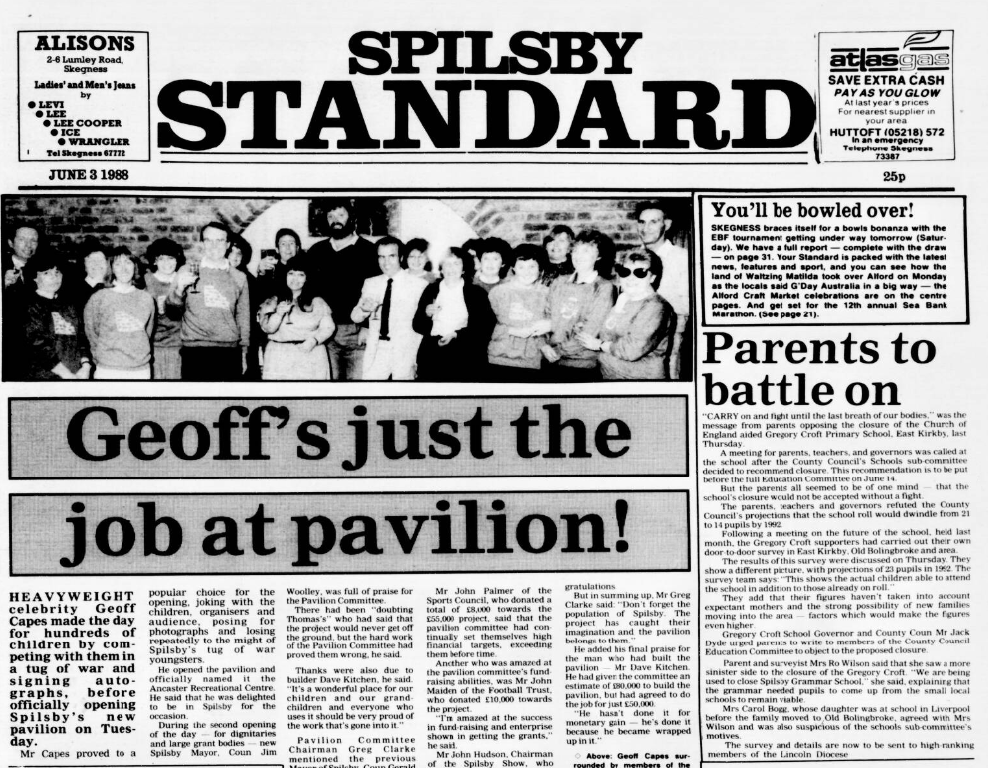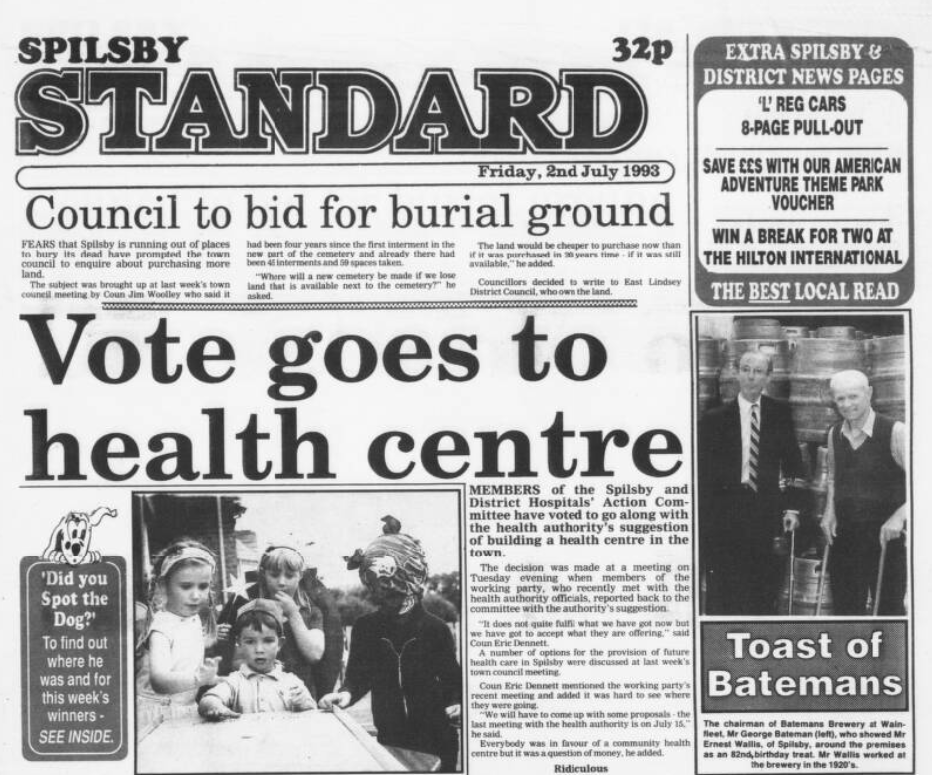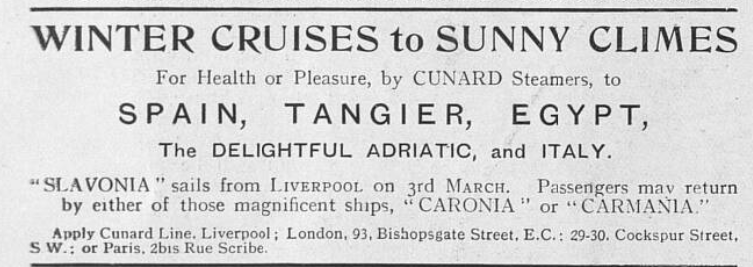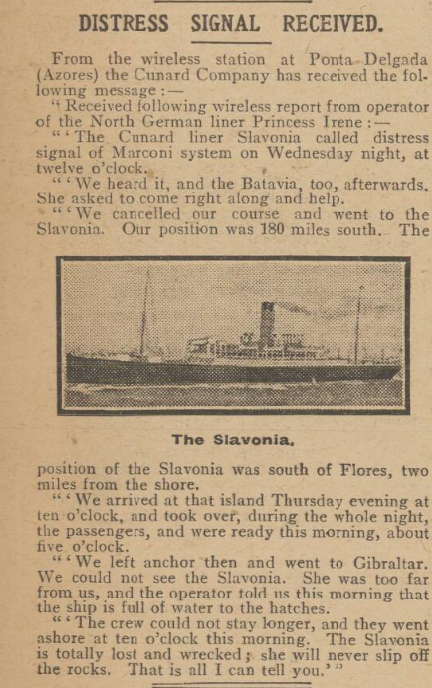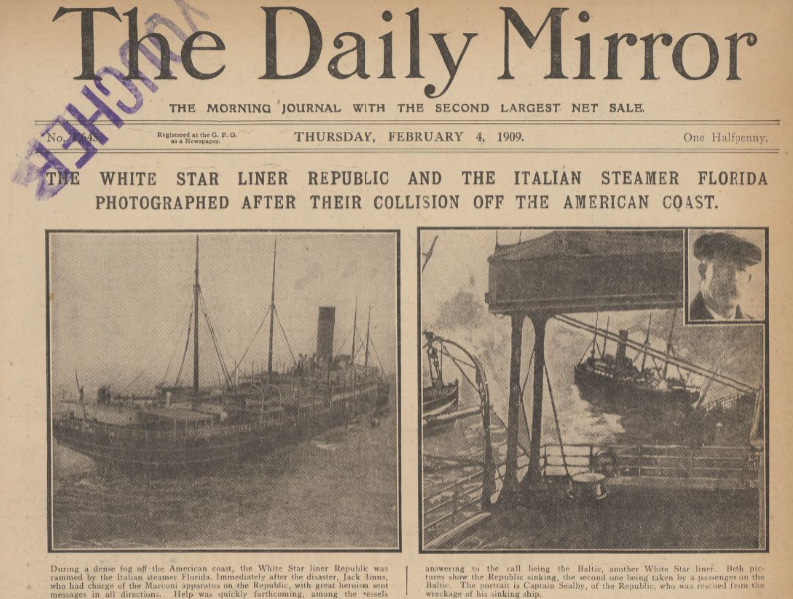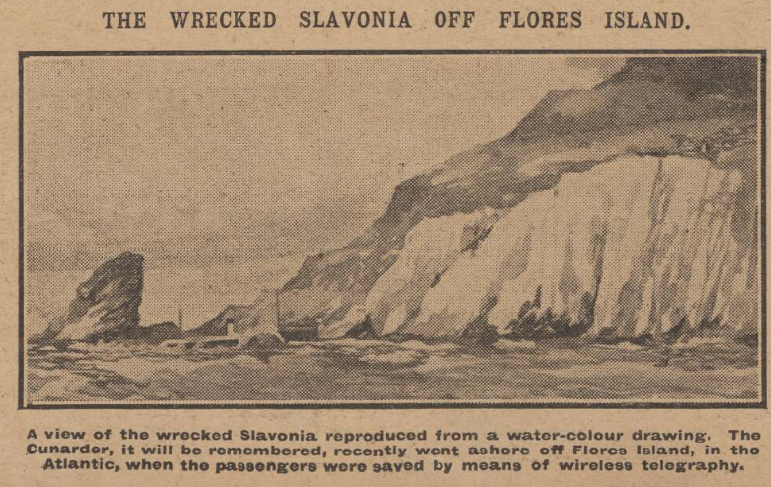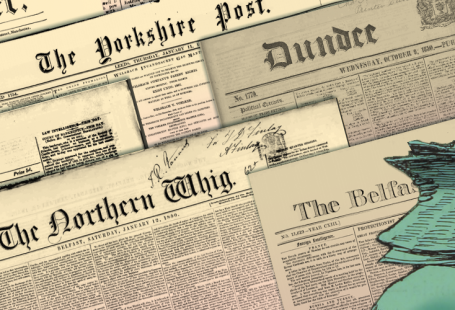This week at The Archive we have surpassed ourselves by adding 1,007,483 brand new pages, as we also mark 115 years since the SOS distress signal was first used when RMS Slavonia ran aground in the Azores in June 1909. As well as adding over one million brand new pages to our collection, we’ve added one brand new title, the Spilsby Standard, whilst we have updated 51 of our existing titles from across the United Kingdom.
From Biggleswade to Blairgowrie, from Caernarvon to Callander, from Tiverton to Tyrone, we’ve added new pages from England, Wales, Scotland and Northern Ireland. Meanwhile, we’ve also reached a landmark 79 million pages all available to search at The Archive, as we’ve added over 270 years of headlines, from 1730 all the way to 2003.
So read on to discover more about all of our new and updated titles, and also to learn about the wreck of the RMS Slavonia, which took place 115 years ago this week.
Register now and explore the Archive
Before we look at the sinking of the RMS Slavonia, we wanted to introduce our new title of the week, the Spilsby Standard. This Lincolnshire title traces its history back to the Horncastle, Spilsby, Alford and Lincolnshire Standard, which was founded in 1912. This newspaper itself has a complex history, boasting a number of name changes, becoming known as simply the Lincolnshire Standard in 1928.
Fast forward nearly 50 years, and it was time for the market town of Spilsby to get its own edition of the Lincolnshire Standard. This Spilsby edition was founded in 1977, however there was a small gap in its publication between the years of 1981 and 1983. In 1988 the Spilsby edition became a title in its own right, the publication being named the Spilsby Standard, however just a year later the paper reverted to its previous name of the Lincolnshire Standard.
We did warn you that this title has a complex history! In 1992 the newspaper again became known as the Spilsby Standard. It appeared weekly every Friday, and was sold in and around the town of Spilsby, which lies at the southern end of the Lincolnshire Wolds.
The paper, however, was not actually printed in Spilsby, but was produced in the market town of Boston, in the same editorial offices as sister paper the Skegness Standard. Unfortunately, the Spilsby Standard is no longer in publication, and Spilsby is served today by the Skegness Standard.
That’s it from our solo new title of the week, and before we move on to take a look at the first use of the SOS distress signal during the wreck of the RMS Slavonia, we wanted to highlight some of our incredible updated titles. Our updates this week have an undeniably Welsh flavour, with nine of our existing Welsh titles being updated. We’ve added a staggering 94,000 pages to Swansea’s South Wales Daily Post, with significant updates also joining fellow Welsh titles the Caernarvon & Denbigh Herald, the Herald of Wales, and the Welshman.
Back across the Welsh border in England, we’ve added over 89,000 brand new pages to the Liverpool Evening Post, whilst over 66,000 brand new pages join the Hull Daily News. We’ve also updated a range of our titles from the West Country this week, with new pages joining the likes of the West Briton and Cornwall Advertiser, the Tiverton Gazette (Mid-Devon Gazette) and the North Devon Herald.
Finally, we’ve updated five of our Scottish titles, with new pages joining the likes of the Blairgowrie Advertiser and the Callander Advertiser, and representing Northern Ireland is County Tyrone’s Mid-Ulster Mail, which we have also updated this week.
115 Years Since The First Use of the SOS Distress Signal – The Wreck of the RMS Slavonia
This week marks 115 years since Cunard liner the RMS Slavonia was wrecked in the Azores. As the ship ran aground, wireless operators were able to put out an ‘SOS’ message, marking the first time that the distress signal had ever been used. Exploring the new pages added to our Archive this week, we learnt more about this incident, in which no lives were lost.
On 15 June 1909, five days after the Slavonia ran aground, the Tiverton Gazette reported how ‘the Cunard liner Slavonia, from New York to the Mediterranean, was stranded on Friday on the south-west of Flores Island, in the Azores.’ Thanks to advances in technology, ‘all the passengers were rescued by other vessels called to the spot by wireless telegrams.’
Meanwhile, the Coventry Times on 16 June 1909 detailed how ‘all those on board’ were saved, giving the total passenger number as 410. Interestingly, the paper, in this brief snippet, does not allude to the wireless technology that enabled these passengers to be rescued from the Slavonia.
Following the sending of the SOS signal, 110 cabin class passengers from the Slavonia were rescued by the Prinzess Irene, whilst 300 steerage class passengers were rescued by the Batavia, with the survivors being taken onwards to Gibraltar and to Naples.
At the end of 1909, the Ramsbottom Observer reflected on those ‘saved by wireless’ technology. The article started by noting how:
Mr. Marconi’s wonderful discovery has now become a national institution, and general satisfaction was caused by the announcement in the House of Commons, September 30, that the Government has arranged for the transfer of the Marconi wireless coast stations and free right of using existing and future Marconi patents and improvements for fourteen years.
The Ramsbottom Observer piece reported how ‘dramatic evidence of the value of wireless telegraphy at sea has been afforded on two notable occasions this year.’ Its first example was of the collision of the White Star liner the RMS Republic with emigrant steamer SS Florida in the ‘fog off the coast of Nantucket’ on 23 January 1909. The Republic, with 700 passengers aboard, was ‘in grave peril,’ and its wireless office was wrecked.
However, the wireless ‘apparatus was uninjured,’ and operator Jack Binns ‘immediately set to work to communicate with other vessels which might be in the neighbourhood.’ Soon, ‘ships came to the assistance of the sinking vessel from all points of the compass, with the result that the whole of the passengers and crew were saved.’
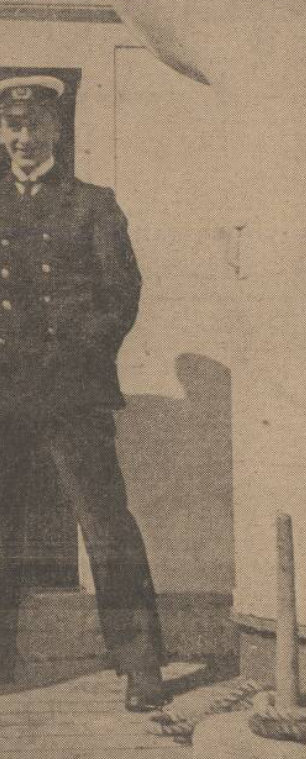
During this incident, the SOS distress signal was not used, as it was during the wreck of the Slavonia. The Ramsbottom Observer, meanwhile, describes how the Slavonia incident was ‘somewhat similar’ to the case of the Republic, relating how ‘the passengers and crew were saved in a few hours by help obtained by means of wireless telegraphy.’
Discover more about shipwrecks, SOS signals, and much more besides, in the pages of our Archive today.
New Titles
| Title | Years Added |
| Spilsby Standard | 1986-1989, 1993-1996 |
Updated Titles
This week we have updated 51 of our existing titles.
You can learn more about each of the titles we add to every week by clicking on their names. On each paper’s title page, you can read a free sample issue, learn more about our current holdings, and our plans for digitisation.
| Title | Years Added |
| Aberdare Leader | 1903-1942, 1944-1949 |
| Bedfordshire Times and Independent | 1987-1988, 1990 |
| Biggleswade Chronicle | 1983 |
| Blairgowrie Advertiser | 1858-1859, 1936-1950 |
| Bridge of Allan Gazette | 1892-1950 |
| Bridlington Free Press | 1993-1996, 2003 |
| Bristol Mirror | 1805-1807, 1833-1834, 1836, 1838-1841, 1843-1864 |
| Bristol Times and Mirror | 1800-1813, 1815-1830, 1834, 1836, 1838-1853 |
| Buxton Advertiser | 1989, 1993-1996 |
| Caernarvon & Denbigh Herald | 1847, 1890-1896, 1898-1912, 1921, 1923-1950 |
| Callander Advertiser | 1912-1950 |
| Clevedon Mercury | 1863-1871, 1873-1875, 1878, 1880-1888, 1890-1950 |
| Clitheroe Advertiser and Times | 1988, 1990 |
| Coleshill Chronicle | 1911-1949 |
| Coventry Times | 1856-1857, 1860, 1864-1868, 1870-1875, 1878, 1881-1888, 1890-1914 |
| Crediton Gazette | 1881, 1883-1888, 1890-1950 |
| Football Post (Nottingham) | 1903-1939, 1947-1949 |
| Gloucester Journal | 1730-1792 |
| Hartlepool Northern Daily Mail | 1964-1965, 1993-1995 |
| Herald Cymraeg | 1855, 1857, 1901, 1903, 1912, 1917-1931, 1937-1950 |
| Herald of Wales | 1909-1910, 1912-1949 |
| Holyhead Mail and Anglesey Herald | 1885-1888, 1891-1896, 1898-1917, 1919-1921 |
| Hull Daily News | 1884-1888, 1900-1909, 1911, 1913-1923, 1925-1930 |
| Irvine Herald | 1877-1878, 1893-1904, 1906-1950 |
| Knaresborough Post | 1989-1990, 1995, 1998-1999 |
| Leamington Spa Courier | 1960, 1965-1967, 1970, 1993-1994, 1997 |
| Liverpool Evening Express | 1875-1876, 1878-1888, 1890-1896, 1912, 1915-1928, 1930-1938, 1946-1950 |
| Llanelli Star | 1909-1950 |
| Market Rasen Weekly Mail | 1998 |
| Matlock Mercury | 1960-1963, 1965-1967 |
| Merioneth News and Herald and Barmouth Record | 1885-1888, 1890, 1892-1896, 1898-1906, 1908-1910, 1912-1920 |
| Mid Sussex Times | 1993, 1995 |
| Mid-Ulster Mail | 2000, 2002 |
| North Devon Herald | 1870-1872, 1874-1876, 1878, 1880-1888, 1893, 1895-1906, 1908-1939, 1941 |
| Peterborough Advertiser | 1978-1979 |
| Ramsbottom Observer | 1898-1899, 1901-1950 |
| Rugby Advertiser | 1993 |
| Sheffield Independent | 1912 |
| Shields Daily Gazette | 1994 |
| Shields Daily News | 1889 |
| South Wales Daily Post | 1896, 1900, 1911, 1913-1918, 1920-1949 |
| St. Andrews Citizen | 1985 |
| Staffordshire Sentinel | 1873, 1875, 1878 |
| Stockport Advertiser and Guardian | 1822-1841, 1843-1861, 1864-1870, 1872, 1874-1876, 1879-1888, 1890-1910, 1912-1950 |
| Stockport County Express | 1890-1892, 1895-1896, 1898-1900, 1902-1910, 1913-1924, 1926-1941, 1943-1948, 1950 |
| Sunderland Daily Echo and Shipping Gazette | 1993-1994 |
| Sussex Express | 1988 |
| Tiverton Gazette (Mid-Devon Gazette) | 1867-1872, 1874, 1878, 1880-1888, 1890-1899, 1901-1902, 1904-1911, 1913-1917, 1919-1938, 1940-1950 |
| Welshman | 1848-1850, 1855-1858, 1860-1865, 1868-1876, 1880-1888, 1891-1893, 1896-1911, 1913-1950 |
| West Briton and Cornwall Advertiser | 1810-1814, 1890-1891, 1901, 1930, 1940 |
| Whitby Gazette | 1989 |
You can keep up to date with all the latest additions by visiting the recently added page. You can even look ahead to see what we’re going to add tomorrow.


